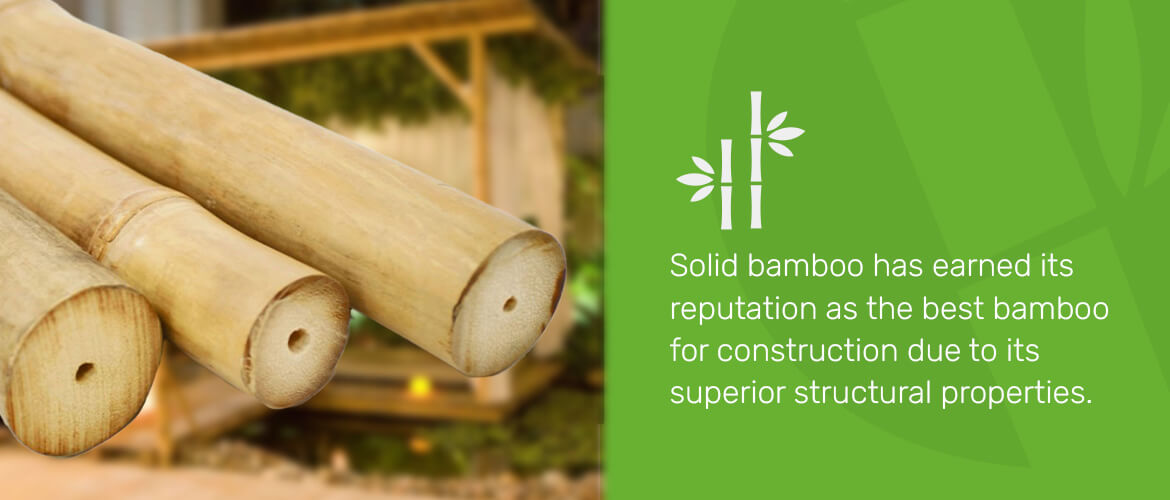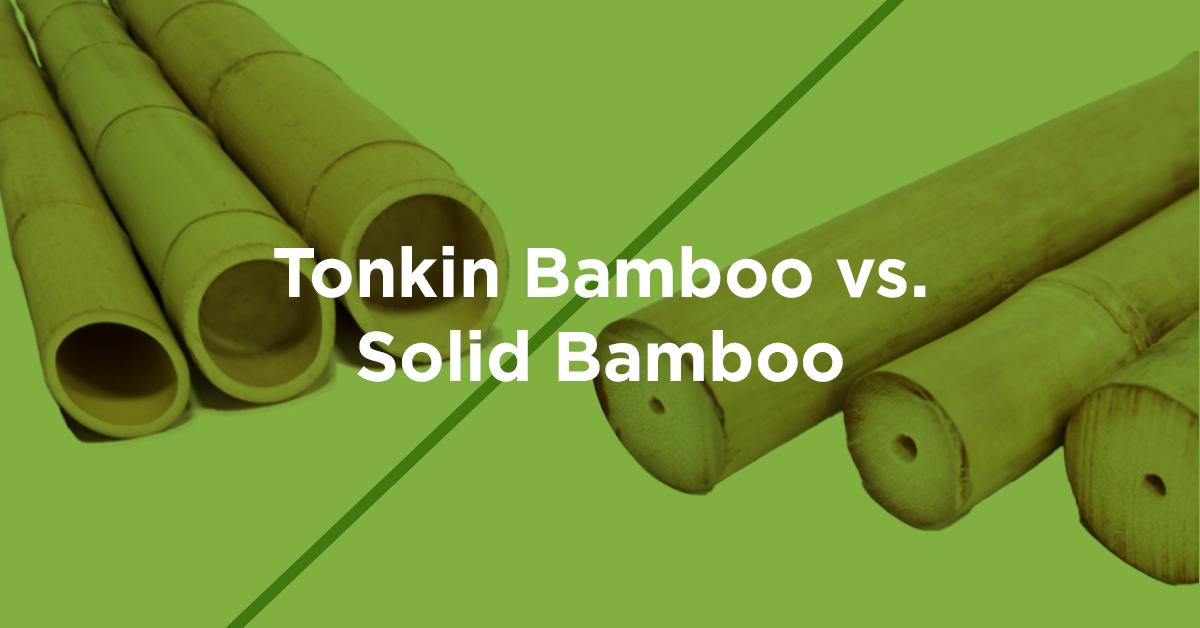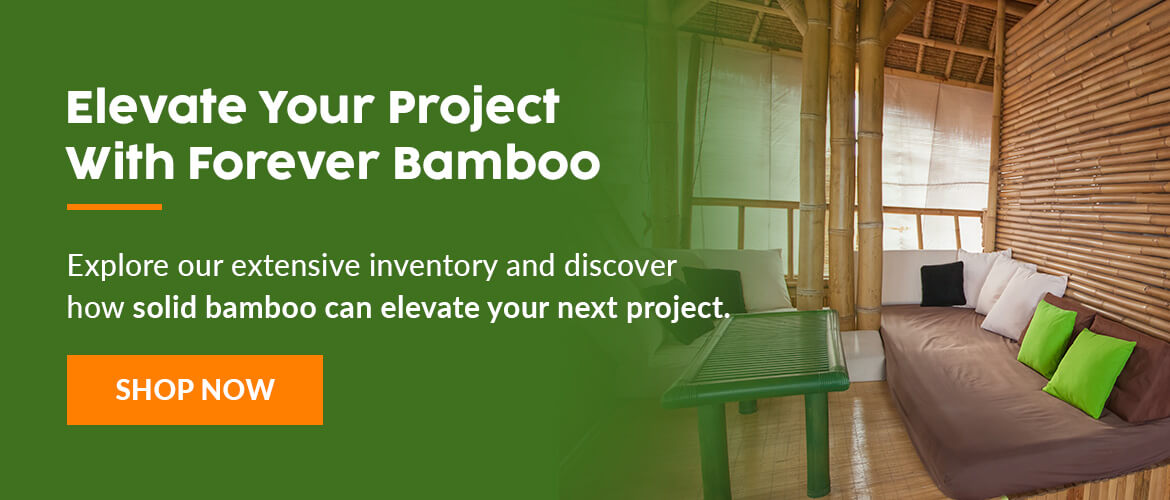Bamboo has emerged as a frontrunner in sustainable building materials, captivating architects, designers and homeowners. As the demand for eco-friendly options continues to rise, two types of bamboo often take center stage — Tonkin and solid bamboo. But which is better for interior and exterior use?
Each has distinct characteristics that affect its suitability for various applications. This article compares solid bamboo vs. Tonkin bamboo, examining their characteristics, uses and comparative advantages for sustainable building and design.
What Is Tonkin Bamboo?
Tonkin bamboo, scientifically known as Pseudosasa amabilis and commonly called “tea stick bamboo,” is a species native to southern China. This bamboo variety is characterized by its straight culms, thin walls and uniform diameter, making it a popular choice for crafting items that require flexibility and lightweight design.
Artisans and manufacturers often turn to Tonkin bamboo to create precision-oriented applications. Its straight growth pattern and consistent diameter make it ideal for crafting items that require attention to detail, such as fishing rods or garden stakes. Tonkin bamboo is also ideal for light furniture and decorative elements that add a touch of natural elegance to spaces.
One of the key advantages of Tonkin bamboo lies in its versatility. Because it’s available in various lengths, it offers the flexibility to work on projects of different scales. Its natural aesthetic appeal makes it a favorite of those seeking to infuse their creations with an organic, minimalist charm. Despite these benefits, several Tonkin bamboo disadvantages may make it unsuitable for applications requiring durability or resistance to environmental factors.
What Is Solid Bamboo?
Solid Bamboo, also known as “Iron Bamboo”, is a thick-walled Vietnamese bamboo species called Tam Vong. Its wall density makes the bamboo pole nearly solid, which makes it one of the strongest bamboo species available with a tensile strength greater than steel. This density also allows it to be crack-resistant, structural, and resistant to the effects of the elements. Solid bamboo’s strength and resilience make it the best choice for exterior projects and ideal for interior use too.
In the construction industry, solid bamboo is used to create floors, countertops and structural elements. Its enhanced stability and strength make it an excellent choice for high-traffic areas and load-bearing applications.
Solid bamboo’s versatility extends to exterior uses. Its increased resistance to moisture makes it suitable for furniture, decking and cladding. This gives designers and homeowners the flexibility to achieve their desired aesthetic without sacrificing performance.
Comparing Tonkin and Solid Bamboo
Explore the differences between Tonkin and solid bamboo below.
Durability and Longevity
When it comes to durable bamboo materials, solid bamboo outperforms Tonkin. The densification process creates a material that is significantly more resistant to weather effects and pest infestation, resulting in durable products and structures.
One of the benefits of solid bamboo is its resistance to warping, cracking and splitting due to temperature and humidity changes, making it ideal for interior and exterior applications. In contrast, one of the primary disadvantages of Tonkin bamboo is its vulnerability to these environmental factors, which can shorten its useful life, especially in exterior settings.
When comparing bamboo longevity, the life span difference between the two materials is substantial. While products made from Tonkin bamboo may need replacement after a few years, solid bamboo items can often last much longer, depending on the climate and conditions.
Strength and Stability

Solid bamboo has earned its reputation as the best bamboo for construction due to its superior structural properties. The manufacturing process aligns bamboo fibers and creates a denser material, resulting in significantly improved compressive and tensile strength compared to natural Tonkin bamboo.
This enhanced strength makes solid bamboo suitable for applications where Tonkin bamboo would be inadequate, such as:
- Flooring in commercial spaces.
- Structural beams in eco-friendly construction projects.
- Exterior decking exposed to the elements.
Its ability to withstand heavy loads and resist deformation under stress makes it a reliable choice for architects and engineers looking to incorporate sustainable materials into their designs.
Solid bamboo is less prone to expansion and contraction in response to environmental changes, ensuring consistent performance across varying conditions. This stability is particularly valuable in applications requiring precise tolerances, such as furniture making.
Environmental Impact
While both types of bamboo are considered sustainable materials, solid bamboo utilizes a larger portion of the bamboo culm. This reduces waste, maximizes resource efficiency and contributes to a circular economy.
The extended life span of solid bamboo products contributes significantly to its environmental appeal. By reducing the frequency of replacements, solid bamboo helps minimize resource consumption associated with the manufacturing and transporting of new items.
Solid bamboo’s dense nature also allows it to store more carbon per unit volume, enhancing its role in carbon sequestration and climate change mitigation. It also provides a durable alternative to hardwoods, potentially reducing deforestation pressures.
Solid bamboo in interior finishes contributes to improved air quality due to low emissions. Moreover, including solid bamboo in construction projects can support green building certifications like Leadership in Energy and Environmental Design, further incentivizing sustainable design practices.
Cost Effectiveness
Tonkin bamboo products have a lower initial cost but are not very durable, meaning you’d have to replace them more frequently. While solid bamboo products are pricier, the long-term economic benefits often justify the upfront cost. Solid bamboo’s superior durability and longevity also result in fewer replacements over time, translating to significant cost savings in the long run.
Maintenance costs also favor solid bamboo. Its resistance to wear and moisture means it requires less frequent maintenance and refinishing than Tonkin bamboo. Solid bamboo’s insulating properties can help save energy in buildings, indirectly reducing costs in applications such as flooring or cladding.
Aesthetic Appeal
Both materials offer unique visual characteristics, but solid bamboo provides greater aesthetic versatility. The manufacturing process allows for a wider range of color treatments and finishes, enabling solid bamboo to complement diverse design aesthetics, from modern to traditional.
Solid bamboo also offers a more consistent appearance, which is often desirable in contemporary design. Additionally, it can be engineered to mimic various wood grains or maintain a distinctive bamboo look. This versatility makes solid bamboo an excellent choice for various interior applications, from wall panels to flooring.
In exterior settings, solid bamboo retains its appearance better than Tonkin, resisting fading and weathering more effectively. This durable aesthetic appeal ensures that exterior projects maintain their intended look for longer, reducing the need for frequent refinishing or replacement.
Elevate Your Project With Forever Bamboo’s Solid Bamboo Solutions
Solid bamboo is the superior option for a wide range of applications compared to Tonkin bamboo. Its enhanced durability, strength and environmental benefits make it ideal for DIY, commercial and residential projects.
At Forever Bamboo, we’re committed to providing top-quality, sustainable bamboo products that meet your evolving needs. Our selection of solid bamboo materials caters to various applications, from flooring to slats and fencing. By choosing solid bamboo items, you’re investing in exceptional performance and longevity and contributing to a more sustainable future.
Explore our extensive inventory and discover how solid bamboo can elevate your next project.


